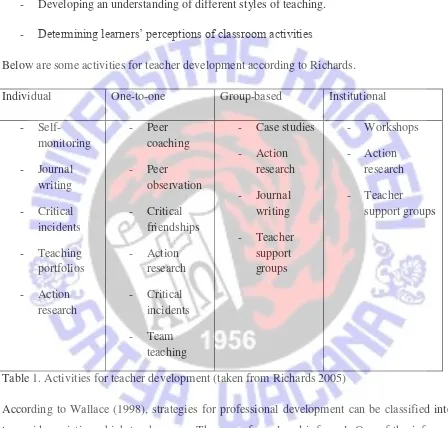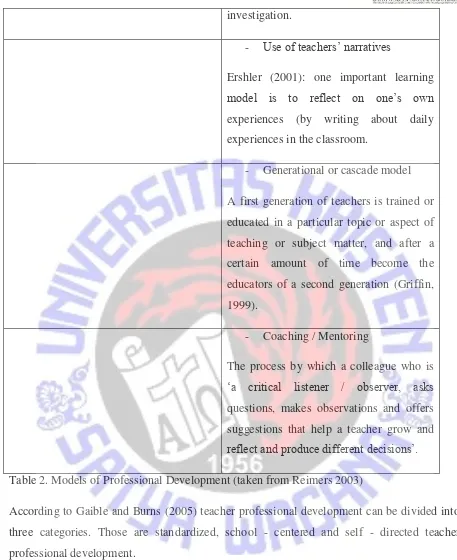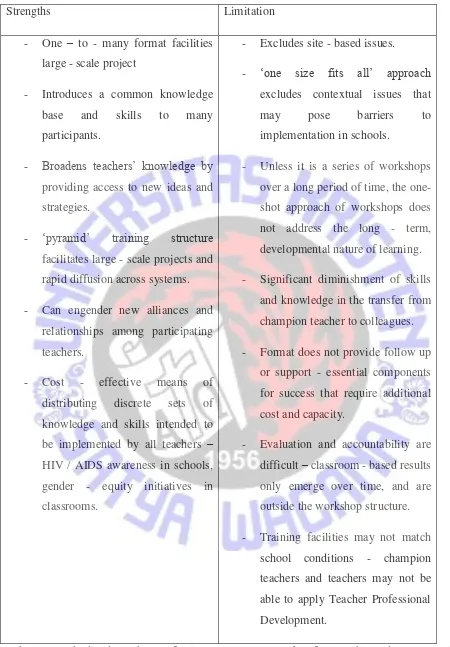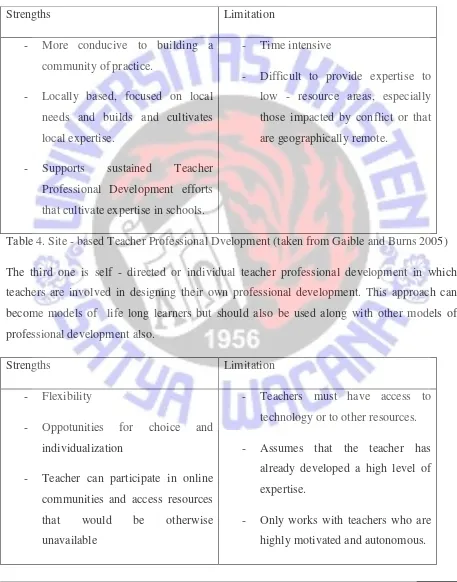Research in Teacher Education : What, How, and Why?, November 21-22, 2012, UKSW 477
DEVELOPING LANGUAGE TEACHERS’
PROFESSIONALISM
Rindang Widiningrum
STiBA Satya Wacana
Abstract
As we know that teacher‟ needs and institution‟s needs are changing over time. Different era reflects different trends. So, teachers have the pressure to always updating their knowledge and skills. In order to be able to reach it teachers should do professional development activities whether it is individually or group supported by the school. There are many kind of forms of professional development which ranging from individual until group activities, such as: when some teachers plan activities for students to do in classroom, when a senior teacher observes a young teacher and gives feedback, joining seminar and workshop, etc. Teacher professional development should be relevant to teachers‟ needs and their work environment in order to be effective. The effective professional development means that the professional development leads to observable improvements in teaching practice and it is a requisite step toward improving students‟ learning.
Keywords: professional development
INTRODUCTION
The changes in educational world require staff development activities so the classroom can
be affected too by the changes. One example is the development of information and
communication technologies. Teachers have to learn how to cope with using computers in
classes and browsing the internet to find update news.
To become an excellent teacher is a long-term process. As Calderhead and Shorock (1997)
stated in Reimers, that teachers must be competent not only to „knowing what‟ and „knowing how‟, but also in „knowing why‟ and „knowing when‟. Professional teachers are committed to bring the best learning they can in their classes.
Research in Teacher Education : What, How, and Why?, November 21-22, 2012, UKSW 478 opportunities. These opportunities can be from personal or from the institutional where
teachers work.
Probably the question that can be asked is: What kinds of professional development activities
best support teachers in teaching?
PROFESSIONALISM
A „professional‟ is someone whose work involves performing a certain function with some degree of expertise (Penny Ur in Richards 2002). Professional teachers are committed to
bring about the best learning they can in their classes. It is relevant with what Bartlett in
Richard and Lockhart (1996) stated that the key to become professional in teaching is
focusing on giving teachers the means to better understand their own classroom practices.
Penny Ur in Richards (2002) stated that there are many implications of the statement of
English teacher are professional. First is that teachers are a community. It means that they
share the same interests in interaction with one another. Second is, teachers are committed to
reach certain standard and aware of their responsibility toward their learners. The next is
publication. Teachers communicate innovatory ideas to one another and public through
seminars, conferences, journals or books. The next is learning. It means that teachers do not
just teach, but also learn by reading, listening, reflecting, and discussing many things
continually to be better educators. Another implication is autonomous. Teachers are
responsible for maintaining professional standards without somebody tell them what to do.
The last one is teachers are responsible for training new teachers. Those are the implications
of making English teacher as professionals.
According to Richard and Lockhart (1996) : “The degree to which individual teachers have a
sense of professionalism about their work depends upon their own working conditions, their
personal goals and attitudes, and the career prospects available to language teachers in their
community.” It could be said that eventhough the teachers have committed to be professional
but without the support from the surroundings, such collegues or even the institution itself, it
will not work.
Farmer stated that „Bottom up professionalism starting with individual practitioner
Research in Teacher Education : What, How, and Why?, November 21-22, 2012, UKSW 479 THE NEED TO DEVELOP PROFESSIONALISM
As a professional, most teachers agree that the expertise should develop progressively. Beside
that there is a possibility for teachers to turn the need for self - improvement into a
challenging rather than a threatening process.
There are many studies that show that professional development has an impact on teachers‟ belief and behaviour. For example, in Reimers (2003), Wood and Bennet (2000) report the
result of a study, in which a group of early childhood educators in England were helping to
collect data concerning their own theories of play and their relationship to practice. The result
is these educators changed their own theories or teaching practices.
Research reported by Baker and Smith (1999) identified some professional development
characteristics as being the most effective in sustaining change in teachers (Reimers, 2003).
Those are: emphasising on providing concrete, realistic and challenging goals, activities
which include both technical and conceptual aspects of instruction, support from colleaguees, and frequent opportunities for teachers to witness the effects on students‟ learning.
According to Reimers, professional development has several characteristics:
1. It is based on constructivism rather than on a „transmission - oriented model‟. It
means that teachers are treated as active learners who are engaged in concrete tasks of
teaching, assessment, observation and reflection.
2. It is perceived as a long - term process as it acknowledges the fact that teachers learn
over time.
3. It is perceived as a process that takes place within a particular context. The most
effective form of professional development is based in schools and is related to the
daily activities of teachers and learners.
4. It is intimately linked to school reform. A teacher professional development
programme that is not supported by the school is not effective.
5. A teacher is conceived of as a reflective practitioner, someone who enters the
profession with certain knowledge base, and who will acquire new knowledge and
experiences based on that prior knowledge. So, the role of professional development
Research in Teacher Education : What, How, and Why?, November 21-22, 2012, UKSW 480 6. It is conceived as a collaborative process. It means there are meaningful interactions
not only among teachers themselves, but also between teachers, administrators,
parents and other community members.
7. Professional development may look and be very different in diverse setting. It has to
be considered within a framework of social, economic and political trends and events.
According to Gaible and Burns (2005) effective Teacher Professional Development should
cover areas of teaching: content, curriculum, assessment and instruction. Teacher
Professional development programs should:
1. Address teacher and student needs. It can be done through approaches that are suitable
with the condition in schools.
2. Be long-term, ongoing, sequenced, and cumulative. It provides teachers many
opportunities to gain new knowledge and skills, reflects on changes in the teaching
practices, and increases their abilities over time.
3. Focus on student learning outcomes. In ways that this can enable teachers to use their
new knowledge and skills.
4. Model learner - centered instruction. In order to enable teachers experience and reflect
on the learning activities that they will lead.
5. Use formative and summative evaluation. It is for program improvement.
In relation with that, according to Richards (2005) in teacher‟s personal development, there
are a number of areas of professional development may be identified. Those areas are:
- subject - matter knowledge, such as English grammar, discourse analysis,
methodology and other areas that define the professional knowledge base of language
teaching.
- pedagogical expertise, such as the mastery of new areas of teaching, improving ability
to teach different skills to learners of different ages and backgrounds.
- self - awareness, the knowledge of one self as a teacher (principles and values,
strengths and weaknesses).
Research in Teacher Education : What, How, and Why?, November 21-22, 2012, UKSW 481 - understanding of curriculum and materials.
- career advancement. The acquisition of the knowledge and expertise necessary for
personal advancement and promotion.
As Pettis argues that there are three important area related to professional growth. The first one is upgrading teachers‟ knowledge and skills to translate the knowledge in their teaching. Second, teachers‟ professional interests and needs should change over time. It means that teachers should be more concerned with the reasons behind the choosing of various teaching
techniques and activities which they use. The last one is the need to have a personal and
ongoing commitment to make professional development activities their personal plan.
Professional development activities are intended not only to improve the performance of
teachers but also giving benefit to the school. The improvement of the schools‟ performance
as a whole can attract more students, achieve better learning outcomes and also for the
reputation of the institution. (Richards 2005) It means that the school should provide
opportunities for professional development for all staff.
Borko and Putnam (1995) stated in Reimers (2003) that professional development plays an important role in changing teachers‟ teaching method and these changes have a positive impact on students‟ learning. It is also related to the role of teachers in students‟ achievement. It has been recognized that teachers are the most important factor in students‟ achievement.
So it might be concluded that professional teachers are supposed to bring the best learning
they can in their classes. In relation to that, teacher must be familiar with the strategies to
achieve professional development.
STRATEGIES TO ACHIEVE PROFESSIONAL DEVELOPMENT
Richards (2005) „The pressure for teachers to update their knowledge in areas such as curriculum trends, second language acquisition research, composition theory and practice,
technology, or assessment is intense, and it is the school and the classroom that provide a major source for further professional development.‟
Richards also mentioned some examples of goals from a development perspective. Those are:
Research in Teacher Education : What, How, and Why?, November 21-22, 2012, UKSW 482 - Understanding how teachers roles change according to the kind of learners we are
teaching
- Understanding the kinds of decision making that occur during lessons.
- Reviewing teachers own theories and principles of language teaching.
- Developing an understanding of different styles of teaching.
- Determining learners‟ perceptions of classroom activities
Below are some activities for teacher development according to Richards.
Individual One-to-one Group-based Institutional
-
Self-Table 1. Activities for teacher development (taken from Richards 2005)
According to Wallace (1998), strategies for professional development can be classified into
two wide varieties which teachers use. Those are formal and informal. One of the informal
strategies is informal discussions with colleagues about classroom experiences or problems
related to specific students. The example of the formal one is attendance at conferences.
This also supported by Ganser (2000) in Reimers (2003) that: “Professional development
includes formal experiences (such as attending workshop and professional meetings,
mentoring, etc.) and informal experiences (such as reading professional pulications, watching
Research in Teacher Education : What, How, and Why?, November 21-22, 2012, UKSW 483 Reimers (2003) stated that models or types of professional development can be grouped in
two section. The first section require and imply certain organizational or interinstitutional
partnerships. While the second one, can be implemented on a smaller scale. The following is
the chart showing all models.
ORGANIZATIONAL PARTNERSHIP SMALL GROUP OR INDIVIDUAL
- Professional - development schools
Partnerships between teachers,
sdministrators and university faculty
members created in order to improve
teaching and learning.
- Supervision : traditional and
clinical
Typically completed by an adminisrator
who comes into a classroom, either takes
notes or checks according to a list of
criteria whether the teacher is achiehing all
the necessary requirements, and then
leaves the classroon, giving no feedback.
Clinical: a means of fostering teacher
development through discussion, observation and analysis of teaching „in the clinic of the classroom‟ (Grimmett and Crehan, 1992)
- Other university - school
partnership
Partnership between universities and
schools. (connect practitioners who share
common interests and concerns about
education)
- Students‟ performance assessment
As a form of teachers‟ professional learning and development, and the
creation of a new evaluation system which
would contribute to the quality of
teaching.
- Other Inter - institutional
collaboration
Collaboration between different
institutions (for example, school,
university and government or private
Research in Teacher Education : What, How, and Why?, November 21-22, 2012, UKSW 484 company)
- Schools‟ network - Case - based study
Using carefully chosen, real-world
examples of teaching to be a topic for
discussion among small group of teachers.
- Teachers‟ network
Can be build informally (regular meetings
between teachers) or formally (by
institutionalizing the relationship)
- Self - directed development
Teachers identify one goal which they
consider to important, list the activities
that they will implement to reach the goal,
the resources needed and the ways in
which their progress and accomplishments
will be assessed. Teachers take
responsibility for their own development,
and the role of the administrators and
supervisors is to facilitate, guide and
support that development.
- Distance education
An educational process in which a
significant proportion of the teaching is
conducted by someone removed in space
and/or time from learner (Perraton, 1995)
- Co-operative or collegial
development
Teachers develop their own plan for
professional development in small groups.
- Observation of excellent practice
Teachers have the opportunity to observe
colleagues who have been recognized for
their expertise and excellence in teaching.
- Teachers‟ participation in new
roles
Research in Teacher Education : What, How, and Why?, November 21-22, 2012, UKSW 485 influence on, activities such as:
management, organization, support and
monitoring.
- Skills - development model
- Reflective models
Teachers‟ commitment to serve the interests of students by reflecting on their
well-being and on which aspects are most
beeficial to them.
- Project - based models
Developing the students-(teachers and
teachers) capacity to work independently
and collaboratively as reflective
professionals, a goal that is supported not
only by their own project experience but
by accompanying discussion, comparison
and contrast with accounts in the literature
and the work of their fellow-students.
- Portfolios
A collection of items gathered over a
certain period of time to illustrate different aspect of a person‟s work, professional growth and abilities (Riggs and Sandlin,
2000)
- Action Research
A process of investigation, reflection and
action which deliberately aims to improve,
or make an impact on, the quality of the
Research in Teacher Education : What, How, and Why?, November 21-22, 2012, UKSW 486 investigation.
- Use of teachers‟ narratives
Ershler (2001): one important learning model is to reflect on one‟s own experiences (by writing about daily
experiences in the classroom.
- Generational or cascade model
A first generation of teachers is trained or
educated in a particular topic or aspect of
teaching or subject matter, and after a
certain amount of time become the
educators of a second generation (Griffin,
1999).
- Coaching / Mentoring
The process by which a colleague who is „a critical listener / observer, asks questions, makes observations and offers
suggestions that help a teacher grow and reflect and produce different decisions‟.
Table 2. Models of Professional Development (taken from Reimers 2003)
According to Gaible and Burns (2005) teacher professional development can be divided into
three categories. Those are standardized, school - centered and self - directed teacher
professional development.
Standardized teacher professional development programs involving workshops, training
sessions, which generally focus on the exploration of new concepts and demonstration and
modelling of skills. Although it has many good activities but workshops taking place at one
Research in Teacher Education : What, How, and Why?, November 21-22, 2012, UKSW 487
- Broadens teachers‟ knowledge by
providing access to new ideas and
strategies.
- „pyramid‟ training structure
facilitates large - scale projects and
rapid diffusion across systems.
- Can engender new alliances and
relationships among participating
teachers.
- Cost - effective means of
distributing discrete sets of
knowledge and skills intended to
be implemented by all teachers –
HIV / AIDS awareness in schools,
gender - equity initiatives in
classrooms.
- Excludes site - based issues.
- „one size fits all‟ approach
excludes contextual issues that
may pose barriers to
implementation in schools.
- Unless it is a series of workshops
over a long period of time, the
one-shot approach of workshops does
not address the long - term,
developmental nature of learning.
- Significant diminishment of skills
and knowledge in the transfer from
champion teacher to colleagues.
- Format does not provide follow up
or support - essential components
for success that require additional
cost and capacity.
- Evaluation and accountability are
difficult – classroom - based results
only emerge over time, and are
outside the workshop structure.
- Training facilities may not match
school conditions - champion
teachers and teachers may not be
able to apply Teacher Professional
Development.
Research in Teacher Education : What, How, and Why?, November 21-22, 2012, UKSW 488 The second one is school - centered or site - based teacher professional development. It
usually takes place in schools or teachers colleges and focus on specific problems that some
teachers have in their classroom practices. Although it is considered to be important and
effective but it is sometimes only works in school level.
Strengths Limitation
- Supports sustained Teacher
Professional Development efforts
that cultivate expertise in schools.
- Time intensive
- Difficult to provide expertise to
low - resource areas, especially
those impacted by conflict or that
are geographically remote.
Table 4. Site - based Teacher Professional Dvelopment (taken from Gaible and Burns 2005)
The third one is self - directed or individual teacher professional development in which
teachers are involved in designing their own professional development. This approach can
become models of life long learners but should also be used along with other models of
communities and access resources
that would be otherwise
unavailable
- Teachers must have access to
technology or to other resources.
- Assumes that the teacher has
already developed a high level of
expertise.
- Only works with teachers who are
Research in Teacher Education : What, How, and Why?, November 21-22, 2012, UKSW 489 - Since the teacher works alone, the
altritian rate may be higher.
- When technology is not working,
the learning opportunity is lost.
Table 5. Self - directed Teacher Professional Development (taken from Gaible and Burns
2005)
CONCLUSION
As Michael J. Wallace wrote in his book Action Research for Language Teachers, “One of the qualities that we should therefore expect in the strategies that we consider for professional
development is that these strategies should help us to turn the problems we face in our professional careers into positive rather than negative experiences.”
There are many strategies or models for language teachers to be developed. Teacher can start
by doing individually or in a small group, such as doing reflection or observation of excellent
practice. Daily matters at school can be interested, such as whether the learners work better in
small groups or as a whole class led by the teacher (Taylor in Richards 2002)
Another simple thing to do as a start for teacher‟s professional development is self - directed. It means individually, teacher set a goal, plan the activities to implement the program and
they also decide the ways in which the progress and accomplishments will be assessed. In
other word, teachers take responsibility for their own development. What teachers should
remember is they should have self commitment about this. And this professional
development is on-going process and should be done progressively.
Another thing is apart from teachers‟ benefit, this professional development is supposed to support the teaching in classroom also. The changes in the world of education are often
considered to be rapid and teacher must be able to integrate the effects of the changes into
practices.
There should be a continuous exploration, reflection, discussion and application in which
teachers will professionally grow and the students will gain deeper knowledge. This process
Research in Teacher Education : What, How, and Why?, November 21-22, 2012, UKSW 491
REFERENCES
Farmer, Frank. 2006. Teacher Training And Development in ELT: A Professional Approach. Indonesian Journal of English Language Teaching Volume 2/Number 2. October 2006.
Gaible, E. And Burns, M. 2005. Using Teachnology to Train Teachers (Online). Available from infoDEV: http://www.infodev.org/en/Publication.13.html (Accessed October 2012 )
Johnson, Karen E. 2009. Second Language Teacher Education: A Sociocultural Perspective. New York: Routledge.
Reimers, Eleonora Villegas. 2003. Teacher Professional Development: An International Review of The Literature. UNESCO.
Richard, Jack C & Charles Lockhart. 1996. Reflecting Teaching in Second Language Classroom. Cambridge: Cambridge University Press.
Richards, Jack C & Thomas S. C. Farrell. 2005. Professional Development for Language Teachers: Strategies for Teacher Learning. Cambridge: Cambridge University Press.
Richards, Jack C & Willy A Renandya (Eds). 2002. Methodology in Language Teaching: An Anthology of Current Practice. Cambridge: Cambridge University Press.
Thompson, Marnie and Laura Goe. 2009. Models for Effective and Scalable Teacher
Professional Development. Educational Testing Service.
(http://www.ets.org/research/contact.html)




